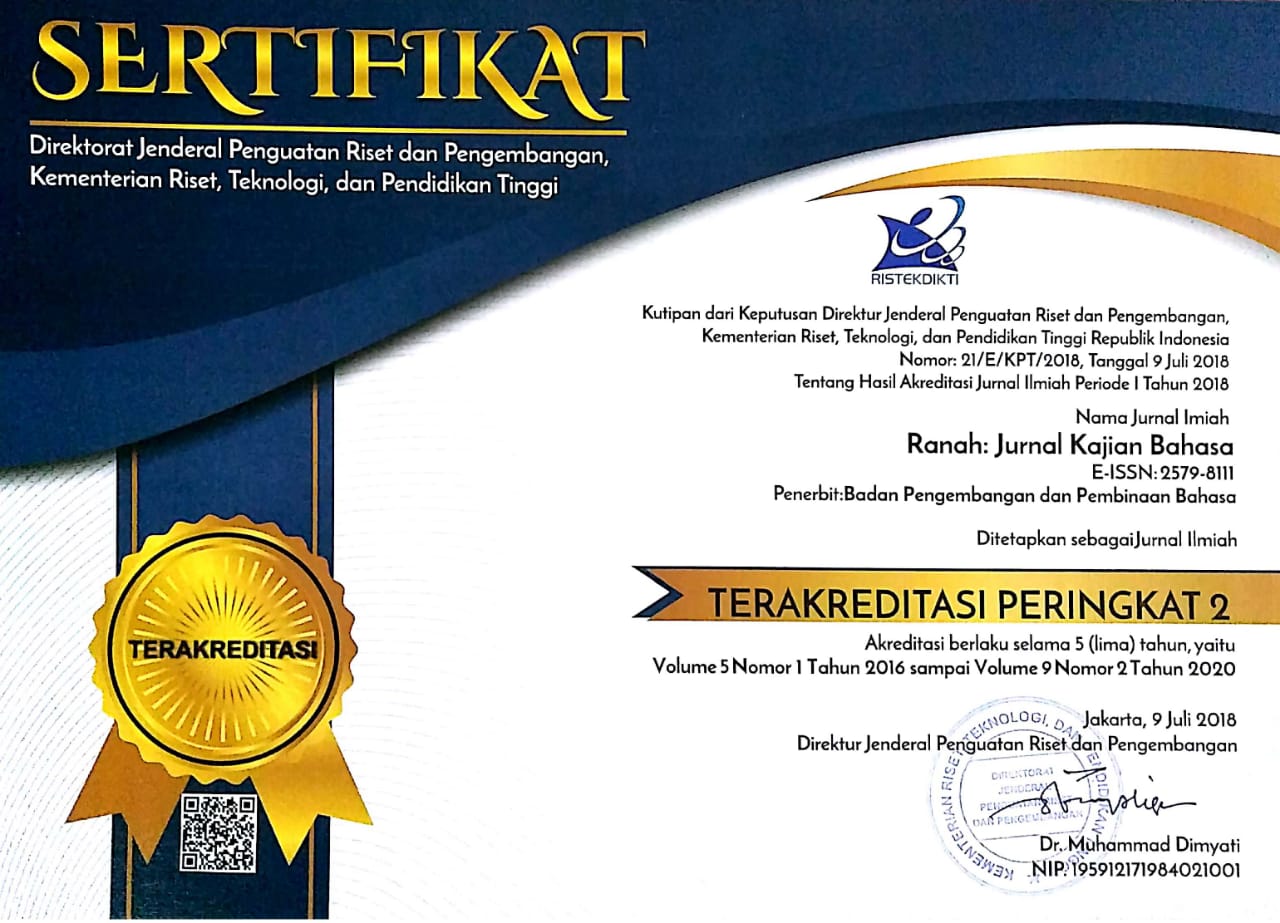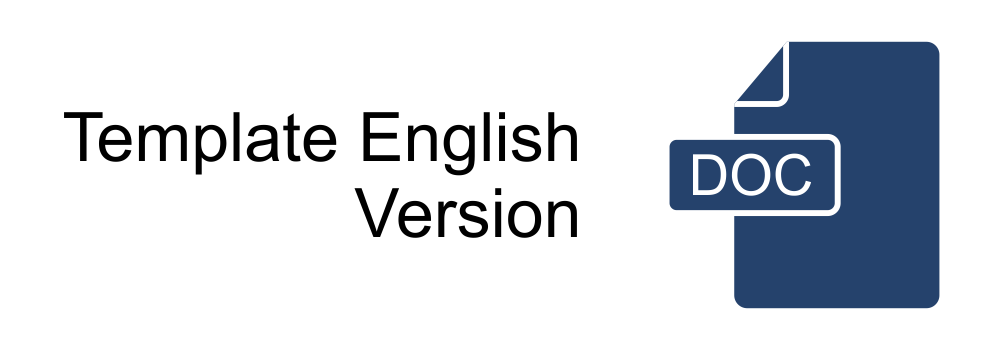Menilik Isu Lingkungan dan Kelestarian Alam dalam UU IKN melalui Linguistik Korpus
Abstract
This study aims to analyze and determine the extent to which environmental issues and natural sustainability are accommodated in Law no. 3 of 2022 concerning IKN using a corpus linguistics approach. The data collected in this research is the complete text of Law no. 3 of 2022 concerning IKN, which covers the entire text of the law, including preambles, articles and attachments consisting of 1,099 tokens and reaching 8,653 word frequencies. This research utilizes the use of tools, namely AantConc version 4.2. The analysis techniques applied are word frequency analysis, keywords, concordance, and N-grams. The results of the findings and analysis of statistical data related to vocabulary on environmental topics show that there is no significance in environmental topics that are facilitated in the contents of Law No. 3 of 2023, especially regulations related to law enforcement against environmental violations. The only keyword that appeared in the first hundred hits was the word 'environment' and it was ranked 78th, far below the words 'authority' and 'government' which were in the top ten area, and development-related keywords which were in the top ten, ranked 20th to 30th. Other keywords related to natural sustainability were found in ranks 200th to 800th, out of a total of 1,099 existing tokens. It shows that environmental and sustainability issues are not discussed in a sufficient proportion since their occurrence is significantly fewer than the frequency of the other keywords related to government and development.
Abstrak
Penelitian ini bertujuan untuk menganalisis dan mengetahui sejauh mana isu lingkungan dan kelestarian alam diakomodasi di dalam UU No. 3 Tahun 2022 tentang IKN dengan menggunakan pendekatan linguistik korpus. Data yang dikumpulkan dalam penelitian ini adalah teks lengkap dari UU No. 3 Tahun 2022 tentang IKN, yang mencakup seluruh naskah undang-undang, termasuk preambule, pasal-pasal, dan lampiran yang terdiri atas 1.099 token dan mencapai 8.653 frekuensi kata. Penelitian ini memanfaatkan penggunaan alat bantu, yaitu AntConc versi 4.2. Teknik analisis yang diterapkan adalah analisis frekuensi kata, kata kunci, konkordasi, dan N-gram. Hasil temuan dan analisis data statistik terkait kosa kata dengan topik lingkungan menunjukkan bahwa tidak ditemukan signifikasi topik lingkungan yang terfasilitasi dalam isi Undang-undang No.3 Tahun 2023, khususnya peratutan terkait penegakan hukum terhadap pelanggaran lingkungan. Satu-satunya kata kunci yang muncul di seratus hits pertama hanyalah kata ‘lingkungan’ dan berada di peringkat ke-78, jauh di bawah kata ‘otorita’ dan ‘pemerintahan’ yang berada di area sepuluh besar, dan kata kunci terkait pembangunan yang berada di peringkat 20 sampai 30. Kata kunci terkait kelestarian alam lainnya ditemukan pada peringkat ke-200 hingga ke-800, dari total 1.099 token yang ada. Hal ini menunjukkan bahwa isu lingkungan dan kelestarian alam tidak banyak dibahas dalam UU IKN karena jumlah kemunculannya tidak sebesar kata-kata kunci lain yang terkait dengan pemerintahan dan pembangunan.
Keywords
Full Text:
PDFReferences
Al Fajri, M. S. (2017). Hegemonic and Minority Discourses Around Immigrants: A Corpus-Based Critical Discourse Analysis. Indonesian Journal of Applied Linguistics, 7(2), 381-390. https://doi.org/10.17509/ijal.v7i2.8349
Al Fajri, M. S. (2019). The Discursive Portrayals of Indonesian Muslims and Islam in the American Press: A Corpus-Assisted Discourse Analysis. Indonesian Journal of Applied Linguistics, 9(1). https://doi.org/10.17509/ijal.v9i1.15106
Altoaimy, L. (2018). Driving Change on Twitter: A Corpus-Assisted Discourse Analysis of the Twitter Debates on the Saudi Ban on Women Driving. Social Sciences, 7(5). https://doi.org/10.3390/SOCSCI7050081
Baayen, R. H. (2008). Analyzing Linguistic Data: A Practical Introduction to Statistics Using R. In Analyzing Linguistic Data: A Practical Introduction to Statistics Using R. https://doi.org/10.1017/CBO9780511801686
Baron, A., Rayson, P., & Archer, D. (2009). Word Frequency and Key Word Statistics in Corpus Linguistics. Anglistik: International Journal of English Studies, 20(1), 41-67.
Biro Hukum Kemenkeu. (2022). Informasi terkait Undang-Undang tentang Ibu Kota Negara (UU IKN). Kemenkeupedia.Kemenkeu.Go.Id.
Carpi, T., & Iacus, S. M. (2020). Is Japanese Gendered Language Used on Twitter? A Large Scale Study. Online Journal of Communication and Media Technologies, 10(4). https://doi.org/10.30935/ojcmt/9141
Chen, M., & Flowerdew, J. (2018). Introducing Data-Driven Learning to PhD Students for Research Writing Purposes: A territory-wide project in Hong Kong. English for Specific Purposes. https://doi.org/10.1016/j.esp.2017.11.004
Fristikawati, Y., Alvander, R., & Wibowo, V. (2022). Pengaturan dan Penerapan Sustainable Development Pada Pembangunan Ibu kota Negara Nusantara. Jurnal Komunitas Yustisia, 5(2).
https://doi.org/10.23887/jatayu.v5i2.51859
Islamiah, M., & Al Fajri, M. S. (2019). Skinny, Slim, dan Thin: Analisis Berbasis Korpus Kata Sifat Identik dan Implikasinya Pada Pengajaran Bahasa Inggris. Ranah: Jurnal Kajian Bahasa, 8(1), 19-32. https://doi.org/10.26499/rnh.v8i1.894
Kania, U. (2022). "Snake Flu," "Killer Bug," And "Chinese Virus": A Corpus-Assisted Critical Discourse Analysis of Lexical Choices in Early UK Press Coverage of the COVID-19 pandemic. Frontiers in Artificial Intelligence, 5. https://doi.org/10.3389/frai.2022.970972
Khair, O. I. (2022). Analisis Landasan Filosofis, Sosiologis dan Yuridis pada Pembentukan Undang-Undang ibu Kota Negara. Academia: Jurnal Inovasi Riset Akademik, 2(1). https://doi.org/10.51878/academia.v2i1.1037
Kinoshita, A., Mori, K., Rustiadi, E., Muramatsu, S., & Kato, H. (2019). Effectiveness of Incorporating the Concept of City Sustainability Into Sustainability Education Programs. Sustainability (Switzerland), 11(17). https://doi.org/10.3390/su11174736
Kurniadi, A. (2019). Pemilihan Ibu kota Negara Republik Indonesia Baru Berdasarkan Tingkat Kebencanaan. Jurnal Manajemen Bencana (JMB), 5(2), 1-12. https://doi.org/10.33172/jmb.v5i2.458
Lutzky, U., & Lawson, R. (2019). Gender Politics and Discourses of #mansplaining, #manspreading, and #manterruption on Twitter. Social Media + Society, 5(3), https://doi.org/10.1177/2056305119861807
Meyer, B. (2023). Corpus-Based Studies of Public Service Interpreting. In The Routledge Handbook of Public Service Interpreting. https://doi.org/10.4324/9780429298202-7
Narayanan, A., Jenamani, M., & Mahanty, B. (2021). Determinants of sustainability and prosperity in Indian cities. Habitat International, 118. https://doi.org/10.1016/j.habitatint.2021.102456
Nugroho, D. (2022). Bentuk dan Kekhususan Ibu Kota Negara Nusantara dalam Negara Kesatuan Republik Indonesia. The Indonesian Journal of Politics And Policy (IJPP), 4(1).
https://doi.org/10.35706/ijpp.v4i1.6527
Nuryanto, T. (2015). Menurunnya Penutur Bahasa Indonesia sebagai Lingua Franca. Al Ibtida: Jurnal Pendidikan Guru MI, 2(2). https://doi.org/10.24235/al.ibtida.snj.v2i2.124
Otorita IKN. (2023a). Respons Masukan RUU Perubahan atas UU 3/2022 Tentang IKN | Topik: Hukum & Regulasi. 21 Agustus 2023.
Otorita IKN. (2023b). Sekilas IKN. Ikn.Go.Id.
Pérez-Cornejo, C., Rodríguez-Gutiérrez, P., & de Quevedo-Puente, E. (2023). City Reputation And The Role of Sustainability in Cities. Sustainable Development, 31(3). https://doi.org/10.1002/sd.2459
Petchprasert, A. (2021). Utilizing an Automated Tool Analysis to Evaluate EFL Students' Writing Performances. Asian-Pacific Journal of Second and Foreign Language Education, 6(1). https://doi.org/10.1186/s40862-020-00107-w
Puspitasari, D. A., & Sukma, B. P. (2022). Portraying the Covid-19 Hoakses at the Beginning of the Pandemic Through a Corpus-Assisted Discourse Analysis. Ranah: Jurnal Kajian Bahasa, 11(2), 243. https://doi.org/10.26499/rnh.v11i2.5152
Ramadhani, A. R. (2018). Lingua Franca in the Linguistic Landscape of Gresik Kota Baru (GKB). Etnolingual, 2(2). https://doi.org/10.20473/etno.v2i2.10569
Ramadhani, R., & Yusa, D. (2023). Upaya Pemerintah Indonesia dalam Mengatasi Resiko Kerusakan. Jurnal Politik, Keamanan dan Hubungan Internasional, 1(3), 144-152. https://doi.org/10.24198/aliansi.v1i3.44008
Rukayah, R. S., Vania, S. A., & Abdullah, M. (2023). Old Semarang City: the Sustainability of Traditional City Patterns in Java. Journal of Asian Architecture and Building Engineering, 22(1). https://doi.org/10.1080/13467581.2021.2024196
Rześny-Cieplińska, J., & Szmelter-Jarosz, A. (2020). Environmental Sustainability in City Logistics Measures. Energies, 13(6). https://doi.org/10.3390/en13061303
Sa'adah, N., Hayyat, M. R., & Fevria, R. (2022). Analisis Issue dalam Etika Lingkungan Terkait IKN. Prosiding SEMNAS BIO 2022, 421-430.
Sagredos, C. (2019). The Representation of Sex Work in the Greek Press: A Corpus-Assisted Critical Discourse Analysis. Journal of Language and Sexuality, 8(2). https://doi.org/10.1075/jls.18012.sag
Shiroda, M., Fleming, M. P., & Haudek, K. C. (2023). Ecological Diversity Methods Improve Quantitative Examination of Student Language in Short Constructed Responses in STEM. Frontiers in Education, 8. https://doi.org/10.3389/feduc.2023.989836
Shruti, S., Singh, P. K., & Ohri, A. (2021). Evaluating the Environmental Sustainability of Smart Cities in India: the Design and Application of the Indian Smart City Environmental Sustainability Index. Sustainability (Switzerland), 13(1), 1-19. https://doi.org/10.3390/su13010327
Solan, L. M., & Gales, T. (2018). Corpus Linguistics as a Tool in Legal Interpretation. Brigham Young University Law Review, 2017(6), 1311-1357. https://doi.org/10.54254/2753-7064/38/20240160
Sopjani, V., & Hamiti, V. (2023). Challenges in the Translation of Legal Texts: the Case in Kosovo. Comparative Legilinguistics, 52. https://doi.org/10.14746/cl.52.2022.15
Stanlaw, J. (2020). Ecolinguistics. The International Encyclopedia of Linguistic Anthropology, 1972, 1-2. https://doi.org/10.1002/9781118786093.iela0110
Susiati, S., & Iye, R. (2018). Kajian Geografi Bahasa dan Dialek di Sulawesi Tenggara: Analisis Dialektometri. Gramatika: Jurnal Ilmiah Kebahasaan Dan Kesastraan, 6(2). https://doi.org/10.31813/gramatika/6.2.2018.154.137--151
Toli, A. M., & Murtagh, N. (2020). The Concept of Sustainability in Smart City Definitions. In Frontiers in Built Environment (Vol. 6). https://doi.org/10.3389/fbuil.2020.00077
DOI: https://doi.org/10.26499/rnh.v13i2.6838
Refbacks
- There are currently no refbacks.








